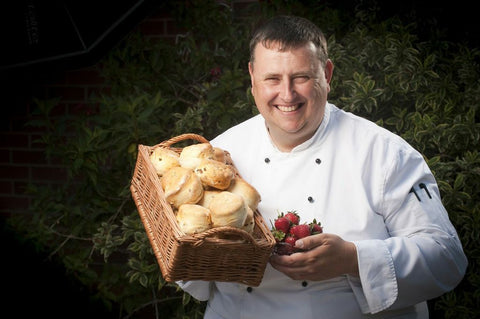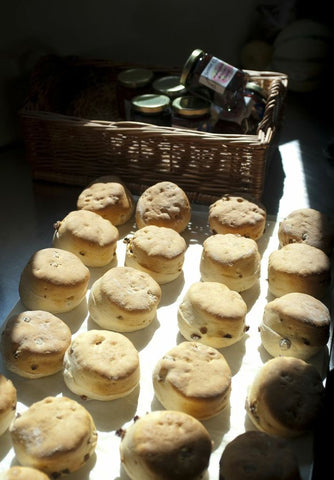At this year’s Exeter Food and Drink Festival, I went to a cooking demonstration by Richard Hunt of the Devon Scone Company on making the perfect scone. Having been in the industry for more than 20 years Richard is a well-known face in the area and often invited to talk at local food events. As well as running the Devon Scone Company with his wife Claire, Richard also provides a professional hospitality consultancy service aimed at sharing his expertise and knowledge with fledgling and experienced chefs or restaurants. One of his many claims to fame is that Kirstie Allsopp has used his scone recipe on her Channel 4 TV programme. As scones are very important to our business and we include Richard’s scones in our Devonshire cream tea hampers I was obviously keen to hear more about his methods for creating the perfect Devonshire scone.

The perfect scone texture
Richard’s scones are a cross between traditional Devon splits and the standard scone. This means that the scones don’t crumble apart into lots of different pieces (important for us when sending creams teas by post). You can actually rip Richards’s scones into two even parts by hand and this is how we believe Devon scones should be!
How to get the perfect scone texture to prevent crumbs
In order to achieve a good scone structure Richard doesn't use eggs, instead his four main ingredients are butter, milk, a strong flour and natural yoghurt.
How to get a good rise on your scones
The acid in the natural yogurt helps the baking powder work better giving a good rise. This good rise actually makes it possible to cut Richard’s scones into three pieces, which is great for anyone wanting more cream and jam on board! It’s also important to keep the pastry thick when you roll it out, to around an inch and a half is ideal.
How to finish your scones off with a nice colour
In order to give his scones a nice colour Richard sprays the scones with non-egg glaze made using vegetable oil and natural food colourings but for home baking glazing with a beaten egg is fine.
Advice when baking fruit scones
Richard has learnt the hard way that when making fruit scones it’s important to use good quality sultanas as cheap ones will go dry when cooked and break when you’re eating the scones.

A simple scone recipe for 20 large Buttermilk scones
Ingredients:
1kg Strong Plain flour
375ml Buttermilk
375ml Natural yogurt
125gm Unsalted butter
125gm Milk powder
125gm Caster sugar
75gm Baking powder
Egg to glaze
Method:
- Preheat the oven to 190◦c, Gas Mark 5 or 175◦c for a fan-assisted oven
- Rub the butter into the dry ingredients until it resembles a breadcrumb like texture
- Gently add the buttermilk/natural yogurt and work the mixture into a soft dough, without overworking the dough as it'll become tough
- Roll out gently to 1 and a half inches thick and cut with a straight cutter
- Glaze with beaten egg and bake for 15-20 minutes until well risen and golden brown
See also - Devon vs Cornwall Cream Tea Differences and advise on Re-heating & Freezing Scones

I just wanted to let you know, your recipe for scones has replaced every scone recipe I’ve ever made. These were absolutely outstanding and and hit with all who attended our family tea!! This one is going into my recipe card box, forget bookmarks on the computer….. this is a keeper!!
Kind regards, Brenda
The recipe in the post has been updated to include natural yogurt.
I don’t see yogurt in the recipe, was it missed?
Hi,
Thanks for sharing your recipe.
I wonder if there’s an alternative for milk powder that works just as well pls ?
Thank you
The dried milk— would that be something like Marvel???